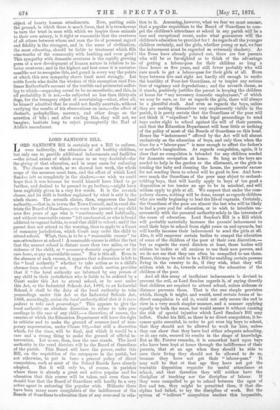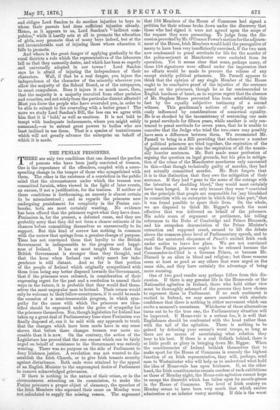LORD BANDON'S BILL. L ow SANDON'S Bill is certainly not a
Bill to enforce, even indirectly, the education of all healthy children, but only one to provide additional inducements and facilities —the actual extent of which seems to us very doubtful—for the giving of that education, and in some cases for enforcing it. The clause on which, as we showed last week, the whore scope of the measure must turn, and the effect of which Lord Bandon left so completely in the shadow,—we wish we could hope that it was because he would himself have liked to go further, and desired to be.pressed to go further,—might have been explicitly given in a very few words. It is the seventh clause, and its drift is further explained by what is said in the ninth clause. The seventh clause, then, empowers the local authority,—that is, in towns the Town Council, and in rural dis- tricts the Board of Guardians,—to warn the parents of any child over five years of age who is "continuously and habitually, and without reasonable excuse "left uneducated, or who is found addicted to vagrant habits, to send that child to school ; and if the parent does not attend to the warning, then to apply to a Court of summary jurisdiction, which Court may order the child to attend school. 'What, then, is to be a "reasonable excuse" for non-attendance at school ? A reasonable excuse is either the fact that the nearest school is distant more than two miles, or the sickness-of the child, or "necessary domestic employment at its own home, or any unavoidable cause." Nor is this all. Even in the absence of such excuse, it appears that a discretion is left to the "local authority" whether to take action as to a child's absence from school or not. For the ninth section provides that if "the local authority are informed by any person of any child in their jurisdiction who is liable to be ordered by a Court under this Act to attend school, or be sent under this Act, or the Industrial Schools Act, 1866, to an Industrial School, it shall be the duty of the local authority to take proceedings under this Act or the Industrial Schools Act, 1866, accordingly, unless the local authority think that it is inex- pedient to take such proceedings." This appears to give the local authority an absolute discretion to refuse to take pro- ceedings in the case of any child,—a discretion of course, the exercise of which the Education Department will have the right to criticise and to make the ground of censure (and of tem- porary supersession, under Clause 19),—but still a discretion which, for the time' will be final, and which it would be a rare and a strong thing to make the ground of official in- tervention. Let us see, then, how the case stands. The local authority in the rural districts will be the Board of Guardians of the parish. This Board will have the power, under this Bill, on the requisition of the ratepayers in the parish, but not otherwise, to put in force a general policy, of direct compulsion, such as most of the School Boards have already adopted. But it will only be, of course, in parishes where there is already a great and active popular zeal for education that this course will be taken, and even then we should fear that the Board-of Guardians will hardly be a very active agent in enforcing the popular wish. Hitherto there have been many more complaints of the indifference of the Boards of Guardians to education than of any over-zeal in rela- tion to it. Assuming, however, what we fear we must assume, that a popular requisition to the Board of Guardians to com- pel the children's attendance at school in any parish will be a rare and exceptional event, under what guarantees will the children's education be provided for ? As regards all the younger children certainly, and the girls, whether young or not, we fear the inducement must be regarded as extremely shadowy. As the Press have already pointed out, there are few parents who will be so far-sighted as to think of the advantage of getting a labour-pass for their children so long a time hence as five years, and still fewer probably who will care much to get a labour-pass for their girls at all. Even boys between five and eight are hardly old enough to excite the hostility of Poor-law Guardians, or to inspire any serious fear of vagrancy and depredations ; and the seventh clause, as it stands, positively justifies the parent in keeping the children at home for "any necessary domestic employment," of which we may be sure, so far as regards the girls, there will always be a plentiful stock. And even as regards the boys, unless they are making themselves very unpleasantly visible in the parish, it is pretty certain that the Guardians of the poor will not think it "expedient" to take legal proceedings to send boys under eight to school against the will of their parents, and that the Education Department will hear little or nothing of the policy of most of the Boards of Guardians on this head. Hence the " inducement " offered by the Act will tell almost exclusively on the education of boys, and only then when the time for a " labour-pass " is near enough to affect the father's or mother's imagination. As regards compulsion, again, it is clear that no compulsion is intended for any children needed for domestic occupation at home. So long as the boys are needed to help in the garden or the allotment, or the girls in tending the baby and cleaning the house, the parents' excuse for not sending them to school will be good in law. And how- ever much the Guardians of the poor may object to orchard- robbing 'boys, that will hardly apply to boys of too good a disposition or too tender an age to be in mischief, and will seldom apply to girls at all. We suspect that under the com- pulsory clause, nothing will be done, except as regards children who are really beginning to lead the life of vagrants. Certainly, the Guardians of the poor are almost the last who will be likely to feel a pure zeal for education, or to wish to interfere un- necessarily with the parental authority solely in the interests of the cause of education. Lord Sandon's Bill is a Bill which will probably materially increase the parents' inducement to send their boys to school from eight years on and upwards, but will hardly increase their inducement to send the girls at all. Also, it will empower certain bodies to compel the education of some of the children of the poor at their own discretion,— but as regards the rural districts at least, those bodies will seldom be bodies at all anxious to use their new powers, and we do not see that they can often be compelled to use them. Hence, this may be said to be a Bill for enabling certain persons living in the country to do, if they wish, what they will seldom wish to do, towards enforcing the education of the children of the poor.
And all this array of inefficient inducements is devised to prevent the evil, as Lord Bandon regards it, of saying directly that children are required to attend school, unless sickness or distance prevents them. That is the one simple provision which, though it might, and would, need certain forms of in- direct compulsion to aid it, would not only secure the end in view in a very much simpler manner, and a manner applying equally to both the sexes, but would secure it without running the risk of special injustice which Lord Sandon's Bill may inflict. Under his Bill, as there is no direct compulsion, it be- comes quite essential, in order to get even big boys to school, that they should not be allowed to work for hire, unless they can show that they have had either adequate schooling, or at any rate, secured its results in the shape of knowledge. But as Mr. Forster remarks, it is somewhat hard upon boys who have been kept at home through the indifference of their parents, that at an age when they should be able to earn their living they should not be allowed to do so, because they have not got their " labour-pass." It may well be that at that age they have not got the tractable disposition requisite for useful attendance at school, and that therefore they will neither have the discipline of teaching nor the discipline of labour. If they were compelled to go to school between the ages of five and ten, they might be permitted then, if that dis- cipline had failed, to try, the discipline of work. But the system of " indirect " compulsion renders this impossible, and obliges Lord Sandon to do another injustice to boys to whom their parents had done sufficient injustice already. Hence, as it appears to us, Lord Sandon's "indirect com- pulsion," while it hardly acts at all to promote the education of girls, may promote that of many boys indeed, but at the not inconsiderable cost of injuring those whose education it fails to promote. And where is the great danger of applying gradually to the rural districts a rule which the representatives of the labourers tell us that they earnestly desire, and which has been so eagerly and universally adopted in our towns ? Lord Sandon says he is afraid of injuring the independence of their characters. Well, if that be a real danger, you injure the independence of the character of the minority wherever you allow the majority of the School Board, or of the ratepayers, to enact compulsion. Does it injure it so much more, then, that the majority is a majority recruited from other parishes and counties, and not solely from the particular district affected? Must you know the people who have overruled you, in order to be able to submit to the overruling with a better grace ? The more we study Lord Sandon's Bill, the less can we agree with him that it is bold,' as well as cautious. It is not bold to tempt with inadequate inducements, where you might safely command,—or to entrust great powers to bodies who are least inclined to use them. That is a species of tentativeness which will not greatly advance the enterprise on behalf of which it is made.































 Previous page
Previous page